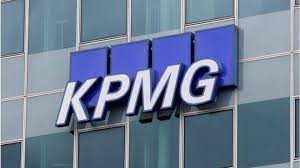KPMG Nigeria, one of the nation’s economic research and professional services firms, has expressed its doubt about the feasibility of President Bola Tinubu’s target to increase the country’s Gross Domestic Product (GDP) growth rate by 6% on average in the next four years.
The research firm, in its Issue 8 Flashnotes released on Friday, noted that the target the new President set during his inauguration speech would be very difficult to achieve in four years.
It maintained that attaining a 6% real GDP growth on average from 2023 to 2026 meant growing the value of real GDP from N74.6 trillion in 2022 to N92.5 trillion by 2026 representing an increase of N17 trillion in four years.
The firm recalled that in the 12-year period from 2010 and 2022, the nation’s real GDP grew by about N17 trillion, adding to achieve the same feat within the next four years by the new administration will be herculean given the increasingly challenging macro-economic trend in the country’s fiscal, monetary, external, and real sectors.
According to KPMG, if the GDP growth of 3% in the first year based on the World Bank’s projection for 2023 is achieved, it implies the economy will then have to grow by an average of 7% for the subsequent three years.
It noted that moving growth from a forecasted 3% in 2023 to at least 7% in 2024 and afterward appeared too overly ambitious.
Justifying its stance through the Flashnotes on why the GDP growth rate target appeared impossible, the firm further clarified: “The fact that Nigeria’s GDP will need to grow by at least 6% to generate enough jobs to absorb labor market growth (about 4% per annum) and reduce poverty is well understood by President Tinubu’s Administration. The president, during his inauguration speech, had set a target to increase the GDP growth rate of the country by 6% on average in the next 4 years through budgetary reforms aimed at stimulating the real sector of the economy. However, we are of the opinion that this might be difficult to attain in four years. For example, the consensus among analysts is GDP growth in 2023 of between 2.7-3.2 %.
“GDP using the expenditure approach, is the cumulation of household and government consumption expenditure, private and public investment, and net exports which means the president will have to introduce policies and take decisions that will lead to growth across these variables. However, taking decisions in one variable can lead to a decline in another.
“For example, to grow government revenue to expand government consumption and investment, it might increase taxes and /or borrow from the private sector. However, increasing taxes can lower purchasing power and slow consumption expenditure growth. At the same time private investment may be curtailed as business earnings are squeezed from slowing demand, higher costs from higher taxes, and higher interest rates as government borrowing crowds out private-sector lending and then pushes rates up”, KPMG added.
It stressed that the ability to maintain a fine and delicate balance across these variables wouldl be important, querying, however, that “but where will the required 6% average growth needed to meet the president’s target come from?”
While noting that the economy will need to grow an additional N17 trillion between now and 2027s through household consumption expenditure, which is the largest share of GDP and the easiest to grow, the professional services firm pointed out that this would be undermined by high double-digit inflation, which is expected to get worse with the subsidy removal.
In addition, it noted that the implementation of the Finance Bill 2022 and the planned unification of the FX rate when implemented in addition to the perennial supply and transportation bottlenecks, security concerns, and power and other infrastructure constraints to doing business in Nigeria would constitute hindrances.
The firm concluded that while the 6% target would be difficult to attain, the best possible GDP growth rate achievable within the next four years would be between 4% – 4.5%.
It projected: “While we expect stronger year-on-year growth over the next few years, we are of the opinion that there is very limited space to attain a 6% average real growth rate in 4 years or an increase in real GDP by N17 trillion. We are of the opinion that an average GDP growth rate of between 4-4.5% at the best is more feasible in the next 4 years. Even this will require the country to get its policies right and keep consistent faith with macroeconomic reforms.”






